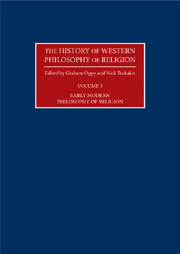Book contents
- Frontmatter
- Contents
- Editorial Introduction
- Contributors
- 1 Early Modern Philosophy of Religion: An Introduction
- 2 Niccolò Machiavelli
- 3 Martin Luther
- 4 John Calvin
- 5 Michel de Montaigne
- 6 Francisco Suárez
- 7 Thomas Hobbes
- 8 René Descartes
- 9 Ralph Cudworth
- 10 Blaise Pascal
- 11 Baruch Spinoza
- 12 John Locke
- 13 Gottfried Wilhelm Leibniz
- 14 George Berkeley
- 15 Voltaire
- 16 The Deists
- 17 Jonathan Edwards
- 18 Thomas Reid
- 19 David Hume
- 20 Denis Diderot
- 21 Immanuel Kant
- 22 Gotthold Ephraim Lessing
- 23 William Paley
- Chronology
- Bibliography
- Index
18 - Thomas Reid
- Frontmatter
- Contents
- Editorial Introduction
- Contributors
- 1 Early Modern Philosophy of Religion: An Introduction
- 2 Niccolò Machiavelli
- 3 Martin Luther
- 4 John Calvin
- 5 Michel de Montaigne
- 6 Francisco Suárez
- 7 Thomas Hobbes
- 8 René Descartes
- 9 Ralph Cudworth
- 10 Blaise Pascal
- 11 Baruch Spinoza
- 12 John Locke
- 13 Gottfried Wilhelm Leibniz
- 14 George Berkeley
- 15 Voltaire
- 16 The Deists
- 17 Jonathan Edwards
- 18 Thomas Reid
- 19 David Hume
- 20 Denis Diderot
- 21 Immanuel Kant
- 22 Gotthold Ephraim Lessing
- 23 William Paley
- Chronology
- Bibliography
- Index
Summary
Thomas Reid (1710–96) is a philosopher of the Scottish Enlightenment renowned for his contributions to epistemology, philosophy of mind and our understanding of the nature of human freedom, and for being the progenitor of the ‘common sense’ school of philosophy. He received a Master of Arts degree from Marischal College, and matriculated there again for a divinity degree. He was licensed to preach by the presbytery of Kincardine O'Neil in 1731, and became an ordained minister to New Machar, Aberdeenshire, in 1737. Following his ministerial work, he was invited on to the faculty of King's College, Aberdeen, as a regent in 1751. This began an illustrious academic career that would lead to his appointment as Professor of Moral Philosophy at the University of Glasgow in 1764, succeeding Adam Smith in that duty. He was elected a Fellow of the Royal Society of Edinburgh in 1783, and served multiple terms as Vice-Rector of the University of Glasgow. He died on 7 October 1796.
Reid is best known for a legacy of common-sense philosophy transmitted by students and aficionados such as Dugald Stewart and James Beattie, even though that legacy should not be taken reliably to represent Reid's considered views. Reid's influence was keenly felt in the pedagogies of early American universities and in the structure of interpretations of early modern philosophers. In contemporary Anglo-American philosophy, Reid's reputation has risen sharply on the strength of his theories of perception, knowledge, action and free will.
- Type
- Chapter
- Information
- The History of Western Philosophy of Religion , pp. 235 - 248Publisher: Acumen PublishingPrint publication year: 2009
- 2
- Cited by

